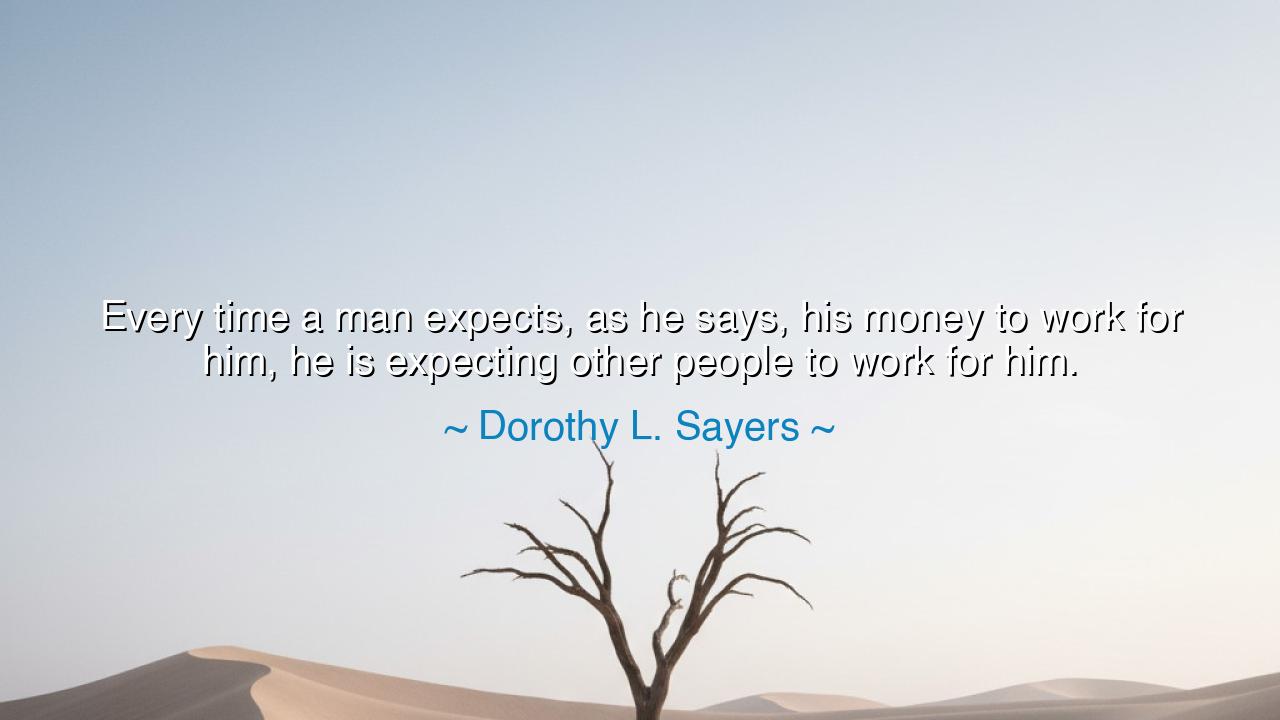
Every time a man expects, as he says, his money to work for him
Every time a man expects, as he says, his money to work for him, he is expecting other people to work for him.






The words of Dorothy L. Sayers, “Every time a man expects, as he says, his money to work for him, he is expecting other people to work for him,” carry the quiet thunder of truth spoken with moral precision. Beneath their elegance lies a challenge to the very foundations of human economy and ethics. Sayers, a writer and thinker of fierce intellect, wrote during a time of great social change in the early twentieth century—an age when machines and markets were beginning to obscure the labor of human hands. Her words cut through this illusion, reminding us that wealth divorced from work is never truly passive, that behind every coin of profit lies the unseen sweat of another.
In essence, Sayers unmasks the myth of passive income. The man who says his money “works for him” imagines a self-sustaining magic, a clever mechanism of growth untouched by human toil. But money itself has no will, no strength, no hands—it cannot plow a field, build a house, or craft a tool. When wealth grows, it does so through the labor of others, through the unseen network of effort that fuels all enterprise. To expect one’s money to “work” is, in truth, to expect others to do that work in one’s place. And thus, Sayers reveals not merely an economic principle, but an ethical one: that we must remember the human cost of comfort, and the moral responsibility that comes with ease.
In this sense, her statement carries the weight of the ancient idea of justice. The philosopher Aristotle taught that every exchange in society must be bound by fairness—that the shoemaker, the farmer, the teacher, and the ruler all contribute their part in proportion. But when one person reaps without sowing, or profits while others labor unseen, balance is broken. Sayers does not condemn prosperity; she condemns forgetfulness—the forgetting that every loaf of bread, every brick, every dividend owes its existence to the strength, time, and spirit of human beings. Her words echo the wisdom of the ancients: that wealth without gratitude becomes exploitation, and that to honor the labor of others is the beginning of moral order.
History provides many examples of this imbalance. Consider the rise of the Industrial Revolution, when factory owners grew rich beyond measure while workers toiled in darkness and danger. The owners spoke of progress, of wealth multiplying by the marvels of machinery—but behind their success lay the weary bodies of men, women, and children whose hands turned those gears. They too believed their money was “working” for them. Yet it was not the coins that labored—it was the people, hidden beneath the noise of the machines. The same illusion persists today, in the quiet hum of global systems where distant workers produce the goods and profits of others. Sayers’s voice rings across time as a reminder: no wealth is innocent of human labor.
And yet, her message is not one of condemnation, but of consciousness. To recognize that one’s gain rests upon the work of others is not to be ashamed of prosperity, but to be accountable for it. The wise man, she implies, does not hide from this truth; he uses it as a compass for fairness. If his money yields fruit, he asks who tended the soil. If his wealth expands, he asks who built the foundation. In this awareness, wealth becomes not a symbol of superiority, but a tool for stewardship—a means of sustaining the labor that sustains the world.
The spirit of Sayers’s words aligns with the teachings of the prophets and philosophers who warned against greed that blinds the heart. “The laborer is worthy of his hire,” says Scripture; “Render to each what is due,” commands the Stoic. To love justice is to remember that every comfort, every luxury, is part of a great chain of effort, in which none stands alone. Sayers’s wisdom calls us to humility—to look beyond the smooth face of profit and see the hands that made it possible.
So let this teaching be passed down: do not let your wealth blind you to the humanity that sustains it. When you profit, ask whose labor has borne the weight. When you rest, remember who still works. The true strength of a society lies not in how much its richest men can make their money “work,” but in how deeply its people honor one another’s labor. As Dorothy L. Sayers teaches, the moral heart of economics is not efficiency, but empathy. For in the end, it is not money that works for man—it is man who works for man, and only through justice and gratitude can that labor become worthy of the name “civilization.”






AAdministratorAdministrator
Welcome, honored guests. Please leave a comment, we will respond soon